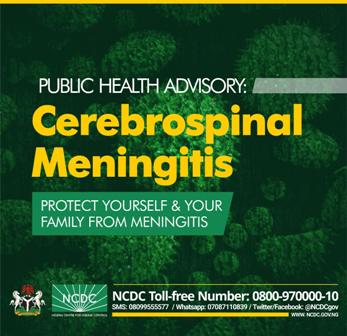As the Meningitis season approaches, the Nigerian Centre for Disease Control (NCDC) has issued an advisory urging Nigerians to be vigilant, “ACT FAST and report any suspected case to the nearest health centre.”
As one of the countries within the Meningitis Belt, Nigeria has recorded outbreaks in the past. Until recently these outbreaks were caused mostly by Neisseria meningitidis serogroup A (NmA). These outbreaks occur in the dry season, due to its low humidity and dusty conditions and usually ends with the onset of the rainy season.
NCDC describes Cerebrospinal Meningitis (CSM) as an acute inflammation of the membranes covering the brain and the spinal cord. It is a very serious infection that can sometimes lead to fatal consequences.
CSM remains a major public health challenge in the African meningitis belt, with 26 States in Nigeria within this belt. Large outbreaks can occur during the dry season (i.e November through May).
“CSM is contagious and can be transmitted through tiny droplets of respiratory secretions from an infected person, during close contact such as coughing or sneezing. The disease is more common among persons aged less than 15 years and deaths are higher among untreated cases.
“Signs and symptoms include sudden high fever, loss of appetite, stiff neck, severe headache, sensitivity to light, difficulty concentrating, and convulsions,” NCDC further reveals.

The agency also announced some preventive measures. These include:
- Avoiding overcrowded places and ensuring adequate ventilation in the home.
- Covering the nose and mouth with a disposable tissue when sneezing, coughing, or blowing the nose and disposing used tissues promptly into a waste bin.
- Minimising contact with droplets when such as turning the head away from people coughing and sneezing.
- Washing your hands frequently especially after coughing or sneezing.
- Visiting the health facility if you notice anyone with symptoms of CSM.
- Ensuring vaccination where available
- Practicing universal care precautions at all times: i.e. wearing gloves, while handling patients or providing care to an ill relative.
“During epidemics, reactive vaccination campaigns can be used to prevent spread of the disease,” NCDC informs,
Below are the NCDC contacts
NCDC Toll-Free Number: 0800-970000-10
SMS: 08099555577
Whatsapp 07087110839
Twitter/Facebook: @NCDCgov




